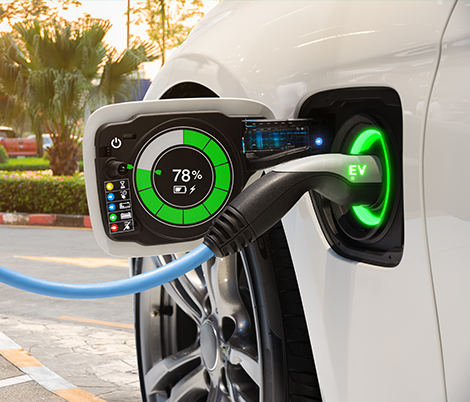EV ROUTE firmly believes in environmental conservation and precautions. The continuous progress in battery technology and the incentive policies put forward by the governments have significantly facilitated the rapid development of EV’s It is well known that charging infrastructures (Ev charging station installations) are the essential connections between EV’s and the power distribution grid. As such, reasonable EV charging stations can not only provide satisfactory charging services for EV users, but also adjust the load distribution efficiently to guarantee the stable and safe operation of power system.
Model Theory
The planning of EV charging stations has been capturing attention from both
academy and industry. One of the main streams of research is to plan IN the
layout of EV charging stations from the economic point of view and minimize
the cost using certain optimization algorithms. For instance, an optimal
model has been proposed to minimize the total cost of installation and
power losses of the distribution system.
Ev Chargers in India
In India this idea is becoming reality with a network of nearly 700 EV
charging stations to be distributed alongside every national highway. The
NATIONAL HIGHWAY AUTHORITY OF INDIA(NHAI) has recently announced plans to
add an EV charging station for every 40 to 60 kms. The organization plans
to cover 40,000 kilometers of the highways by 2023 with EV charging
installation stations. The new charging stations in India could make owning
and charging electric cars more convenient than ever. A total INR 1,000 cr
has been allocated under the Fame-II scheme realizing the need for faster
development of charging infrastructure. Up to 100% funding is allocated for
setting up charging infra at central or state govt offices. State
governments have also announced incentives on charging infrastructure basis
their vision of EV penetration. It should be noted that electricity
incentives are only valid for public charging stations and not for captive
infrastructure.
Finance Key
EV charging Infrastructure finance-In addition. In projecting cashflows for
charging stations is a major concern for financial situations due to the
limited utilization of chargers. To evaluate an EV charging project, the
financier will evaluate the projected cash flows and risk associated with
the project. At present for a PCS, there is typically a large outflow,
including the capital expenditure, grid connection cost, energy cost, debt
servicing, the land fee (if any), as well as operations and maintenance.
The projected cash inflow requires EV growth rate assumptions which are
highly dependent on state and national policies, availability of vehicle
models in the market, consumers awareness and emergence of charging
business models.
There are three main types of EV charging setups depending upon the needs
of the vehicle as per its internal adjustments. They are rapid, fast and
slow. They are also talking about the changes in the power output. Speed
levels are quiets conducive to adjusting the charging powers of the
vehicles. Ev vehicles have specially adjusted the inlets for the charging
purpose. They ask for specialized connectors. Depending upon the power of
charging, the car may be connected with the EV charging software. Providing
you with EV charging solutions at ease. This is only possible by the
implementation of the right avail of EV CHARGING SOFTWARE. This is
supporting the EV charging sustain infrastructure.
EV’S continue to prove themselves as viable alternatives to petrol and
diesel cars, but how do EV charging stations compare to
the ease of gas pumps?
EV charging stations are becoming more and more available as greater EV
adoption is taking place. Infact, the GLOBAL EV CHARGING STATIONS MARKET
was reportedly expected to increase 17% from 2020 to 2021 (from 5.8 billion
to 6.8 billion USD) despite the Covid-19 pandemic. By 2025, the market is
expected to reach 20.5 billion USD.
TYPES OF CHARGING STATIONS;
Specifically,
Home charging systems supply AC power. Therefore, EV will use its on-board
AC-DC converter to charge the battery
Public charging systems may supply both AC OR DC. For higher charging,
charging stations will have much larger AC-DC converters already installed
in them. This power bypasses your EV’s converter and is supplied with pure
DC power.
EV charging stations consist of various key components which now have
standardized names. According to the EUROPEAN MANUFACTURERS ASSOCIATION
(ACEA), these components are:
Vehicle Inlet:
The socket on the EV which receives the charging
power.
Connector:
The end of the charging cable which plugs into the EV.
Cable:
A flexible bundle of conductors which connect the EV to the charging
station.
Plug:
The end of the cable which plugs into the charging station. This can vary
per region-in the US, the plug and the socket outlet are permanently
connected.
Socket outlet:
The socket on the charging station in which the cable is plugged.
Thus, EV chargers turn out to be the best component for the environment
with access at ease. EV ROUTE CHARGERS firmly assures the quality of the
product, making it the best to believe in.



